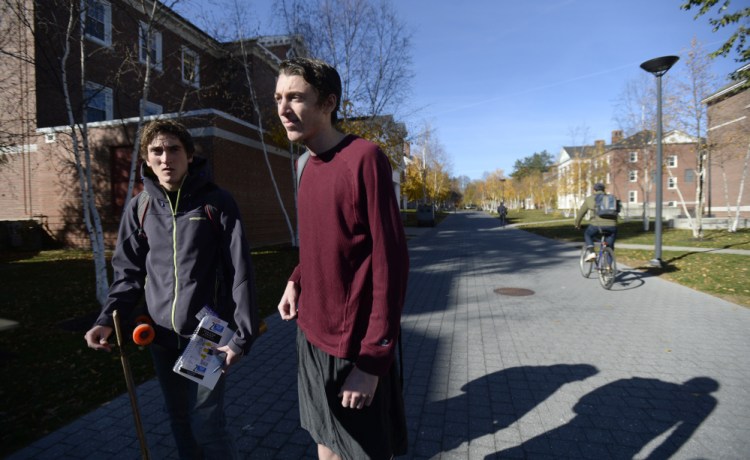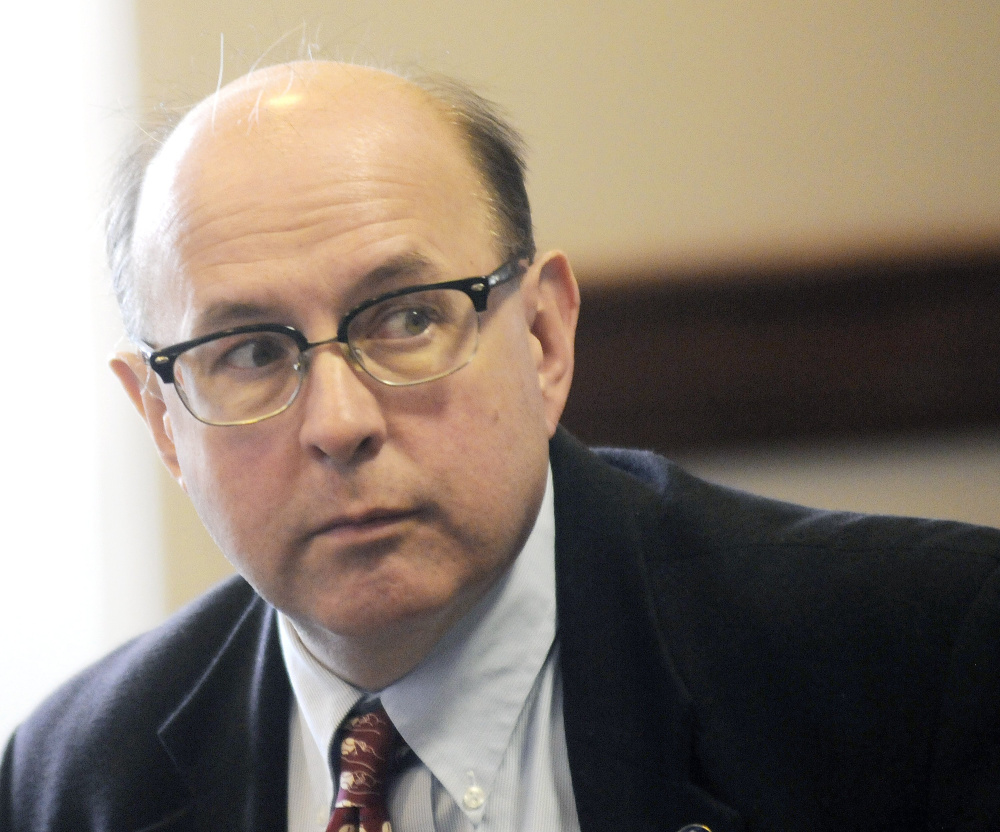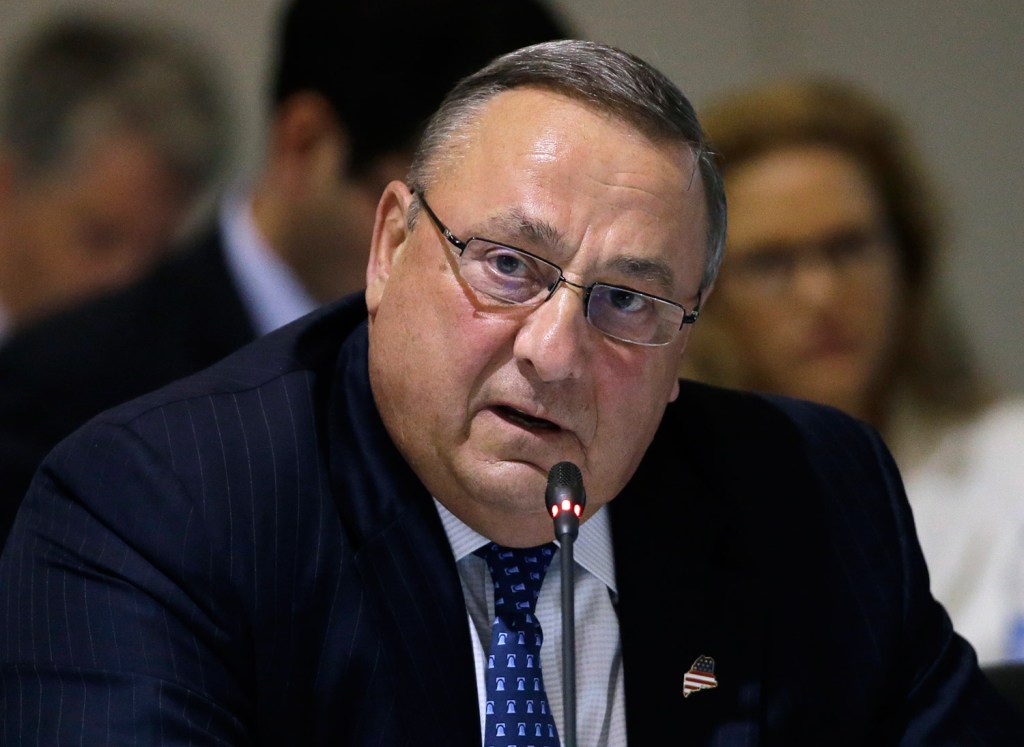LEWISTON — On the eve of Election Day, Gov. Paul LePage stoked fears of voter fraud by college students after fliers showed up around Bates College over the weekend that falsely said students had to register their cars and update their driver’s licenses in Maine in order to vote.
The Republican governor lashed out at Democrats for recruiting college students to vote, saying the practice could lead to double voting, even though there is no evidence to support his assertion.
“Casting ballots in two different states is voter fraud, which is why Maine law requires anyone voting here to establish residency here,” the governor said in a statement Monday. “We welcome college students establishing residency in our great state, as long as they follow all laws that regulate voting, motor vehicles and taxes. We cannot tolerate voter fraud in our state.”
Maine Secretary of State Matthew Dunlap, the state’s top election official and a Democrat, sharply disagreed with the governor’s statement, saying the right to vote is “fundamental,” and students are not required to first register their vehicles or update driver’s licenses to vote in Maine.
Maine Republican Party Chairman Rick Bennett also weighed in, striking a different tone from LePage by issuing a statement Monday night that condemned the flier and any implications the party had something to do with it.
“We denounce the idea of anyone spreading false information to suppress students from voting,” Bennett said, contradicting many Republicans who claimed Monday that the flier was accurate. “Maine GOP teams on campuses are working to ensure students get out to vote. This confusion hurts our efforts as well.”
A U.S. Supreme Court decision in 1979 established that college students can choose to vote in their home state or in the state where they attend college. Of the 68,500 college students in Maine, about 16,500 – 24 percent – are from out of state.
The American Civil Liberties Union of Maine described LePage’s comments as a clear instance of voter intimidation and called for an investigation by the U.S. Department of Justice.
“The governor’s statement seems designed to make college students afraid to vote,” said Zachary Heiden, the group’s legal director. “College students who live in Maine have the right to vote in Maine, and they are not subject to different laws than anyone else. Many of these young people are voting for the first time in a presidential election. The governor should be encouraging that civic participation, not doing everything in his power to undermine it.”
Writing in a Maine address when registering to vote is considered establishing residency for the purpose of voting in Maine, the secretary of state said. When a voter registers in a new town, it is the responsibility of municipal clerks to notify the voter’s previous city that the person should be removed from that city’s voter rolls. Dunlap said Maine’s clerks do that regularly.
He said claims of fraud by LePage and others are a “phantom menace.” The notion that college students – or anybody – would make the effort to vote more than once is ridiculous and not supported by any evidence, Dunlap said.
“If we get college students to vote once, we’re doing good,” he said.
A FUNDAMENTAL RIGHT
LePage’s comments Monday escalated a debate that began over the weekend after the fliers were discovered at Bates College in Lewiston.
Many, including Dunlap and Bates President Clayton Spencer, said the fliers were an attempt to intimidate voters.
“Voting is the most fundamental right in a democracy,” Spencer said in an interview Monday. “Any attempt to suppress that is extremely troubling.”
The Maine Democratic Party quickly condemned the fliers and then held a news conference Monday afternoon in Lewiston to encourage students not to be intimidated.
“Today, Gov. LePage not only endorsed the flier but amplified its message,” said party Chairman Phil Bartlett. “His statements should be disavowed.”
Although the Maine Republican Party also condemned the fliers, a statement from the Republican chapter in Androscoggin County, where Bates is located, took a different approach. It called the fliers a “false flag” and alleged that Democrats were behind their distribution.
“Having to rely on false-flag operations days before an election shows that the Democrats are desperate because Mainers are not on board with their agenda,” the statement read.
Republicans have had a history of challenging out-of-state students’ right to vote in Maine.
In 2011, then-Secretary of State Charlie Summers, a Republican, launched an investigation into possible voter fraud by college students and noncitizens. The investigation came after then-Maine Republican Party Chairman Charlie Webster challenged him to look into the votes of 206 out-of-state students at Maine universities to determine whether the students had established residency in Maine or whether they voted in Maine and in their home state.
After a two-month review, Summers found no instances of voter fraud.
In 2012, Webster bragged about reserving University of Maine-Farmington buses so they couldn’t be used to bus students to polls on Election Day.
Conflicts also have existed for years in Lewiston over Bates College students voting.
In 2014, after Republican Patti Gagne lost the state Senate race to Democrat Nate Libby, Gagne complained that she won several wards, but lost in wards 1 and 3, where most Bates students would have voted. Gagne is now chair of the Androscoggin County Republican Party.
Last year, in a highly visible race for mayor of Lewiston, Democrat Ben Chin – a Bates alumnus – actively courted college students, much to the displeasure of incumbent Robert Macdonald and his supporters. In the end, Macdonald was re-elected.
LEPAGE’S WARNING
LePage warned Monday of consequences for anyone who votes here and then fails to register their car or update their license.
“After the election, we will do everything we can that is allowed under state and federal law to verify college students who voted here are following Maine law, which is clearly displayed on the secretary of state’s website,” the governor said.
Dunlap said that once individuals consider themselves to be residents of a community, they will eventually need to take steps, such as updating their driver’s license or registering their motor vehicle. But, he said, “There are no statutory triggers that take place that compel you to pay excise taxes immediately on your vehicle in that town.”
Maine Attorney General Janet Mills, also a Democrat, agreed.
“No one should feel that they cannot vote if they are a citizen of the United States, if they are 18 years of age or older and if they are a resident of Maine for however short or long a time,” she said in a written statement. “No one should fear financial consequences for exercising their constitutional right to vote. There are no financial penalties, and it is shameful that anyone would suggest otherwise.”
The fear of voter fraud has been rampant nationwide this election season. On the campaign trail, Republican presidential candidate Donald Trump and supporters have stoked fears of widespread voter fraud leading up to Election Day, despite the lack of evidence that it is occurring.
College students are a regular target of such accusations, because more of them have historically supported progressive or Democratic candidates. Bates has an enrollment of about 1,800 students and nearly 90 percent are from outside Maine.
Rep. Chellie Pingree, a Democrat who represents the 1st Congressional District, issued a statement Monday saying LePage was trying to keep college students from voting.
“There are already fliers going around giving students false information about their right to vote here – the governor should be calling out these lies rather than bolstering them,” she said. “In Maine, we’ve always been proud to have some of the highest voter participation rates in the country. And students – whether they are from Maine or are residents while they attend school – have been a big part of that.”
MISSTATEMENTS ON FLIERS
The fliers, which have not appeared on any other Maine college or university campuses, were discovered Sunday by a student, Sarah Frankie Sigman, at the college’s dining hall. The text said those who choose to register to vote in Lewiston must pay to change their driver’s license and re-register their motor vehicle within 30 days – a process the flier claims could cost a student “usually hundreds of dollars in total,” including the cost of a state motor vehicle inspection.
It’s not known who is behind the fliers.
Several Bates College students said Monday that they had seen the fliers. Most knew they were not accurate, but they worried about the impact on some potential voters.
“I wouldn’t have known right away that what it was saying wasn’t true,” said Chelsea Anglin, 19, who is from New Jersey.
Anglin said she voted absentee in her home state, mostly because she thought her vote might have more impact there. She said she knows many classmates who have voted in Maine.
Bryce O’Brien, 18, of Bristol, Rhode Island, said he’s heard a lot of students describe the fliers as “disgusting,” but he understands the concerns about college students voting in their college town.
“I mean, if I vote to raise taxes on people that live here, is that fair?” he said.
Dunlap said students shouldn’t face any barriers to voting, even imagined ones.
“It’s taking advantage of students who already have a million things to worry about,” he said. “If you put in that seed of doubt, it doesn’t take a lot for them to say, ‘I’m not going to bother.’ ”
Send questions/comments to the editors.




